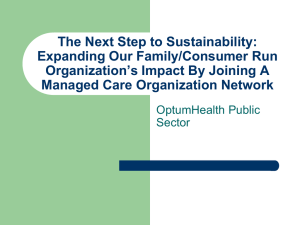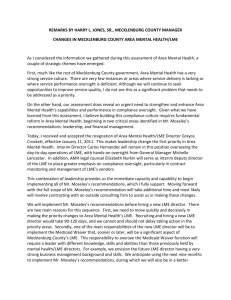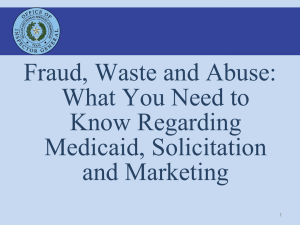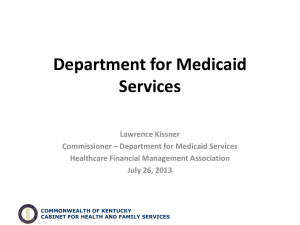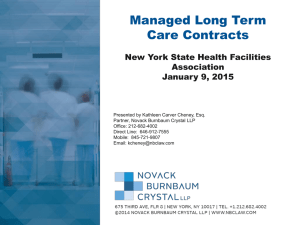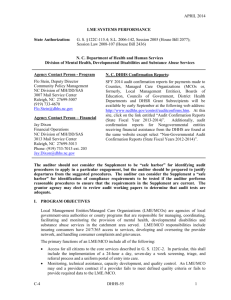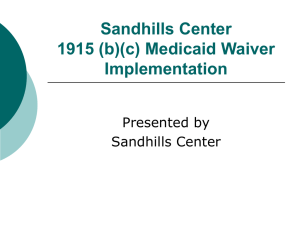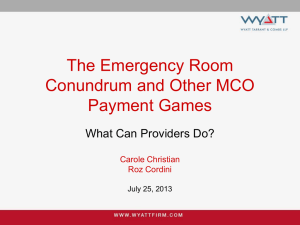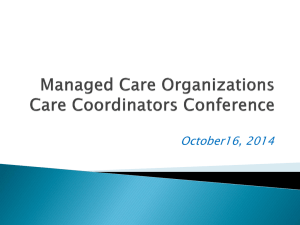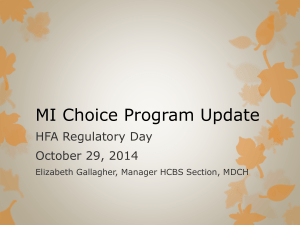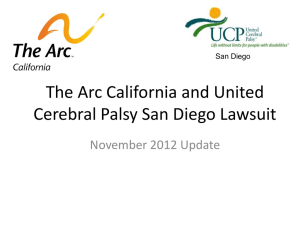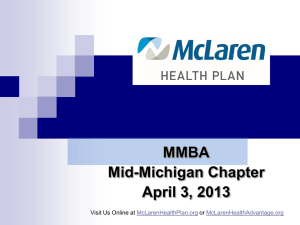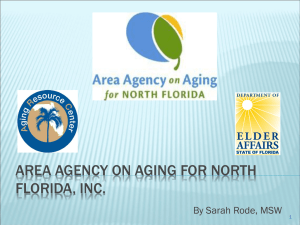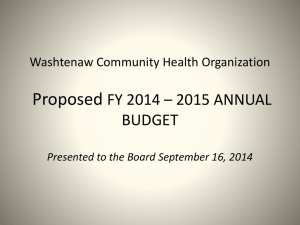Medicaid Services - Carolina Institute for Developmental Disabilities
advertisement
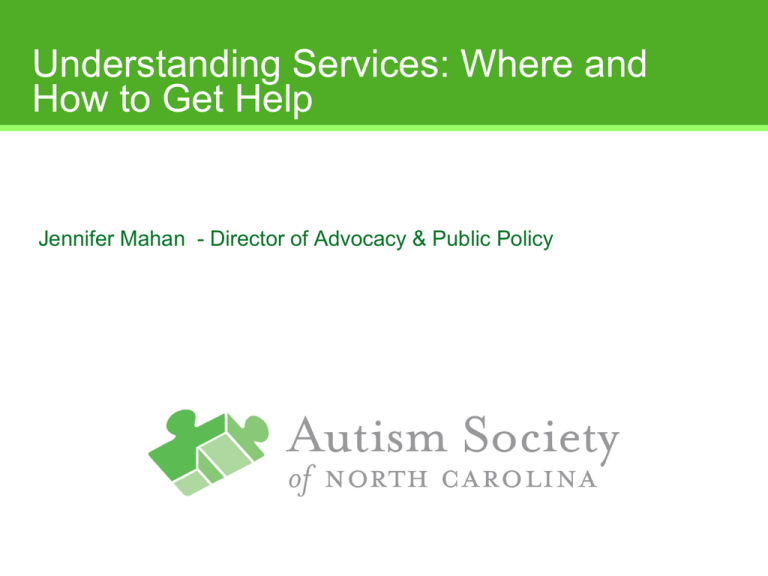
Understanding Services: Where and How to Get Help Jennifer Mahan - Director of Advocacy & Public Policy What are we going to talk about? What are services and how are they funded? How is the system managed? Where do I get help for my child/self/family member? Q&A What are Services? What are they? • Services are extra help or assistance for your family member with autism that can be applied for through the “mental health system.” • Families who have family members with disabilities or people who have disabilities can apply for these services. • Services can include help linking up with other resources, one on one instruction for people in their homes and communities, training for families and respite care. • Services are based on a plan developed after assessments and an eligibility determination process. What Are Services? Who Qualifies Who Qualifies ? • Qualification for some NC services is based on need – not income! • Some services are limited to low income people • A diagnosis of a disability does not guarantee that someone will qualify and receive services. • Criteria for qualifying for NC need based services – Must have substantial, functional limitations in 3 or more areas of life activity – Life Activities: Self-care, understanding and use of language, learning, mobility, self direction, capacity for independent living What are Services? Funding Who funds services? • • • • Private Pay/Private Insurance/Other sources Schools (for services during school day for ed.) State Funds/IPRS and “B3” Medicaid Services vary across the state depending on who funds them and how much funding exists. Services also vary depending on the availability of qualified providers. What are Services? Funding Private Pay: Self (you) pay Insurance: Coverage varies, may have coverage for physical health, mental health care, OT, speech therapy but all autism services not covered Other: Early intervention may be covered though public health, military via Tricare and ECHO Schools: Under Federal law (IDEA), may cover those things that assist with the child’s learning and education What are Services? Medicaid Medicaid (federal funds with state match) • “Traditional” Medicaid – Doctor visits/Emergency Room/Medication – ICF-MR (Intermediate Care Facilities) – Other LTC: Personal Care, Adult Care Home, Nursing Home • Medicaid “Enhanced” Services – Mental Health and Addiction services and supports – “B3”- basic supportive MH, IDD, SA services • EPSDT – Early Periodic Screening Diagnosis and Treatment – Catch-all funding for children – but not habilitation services • Medicaid Home and Community Based Waivers under Managed Care – NC “Innovations” Waiver under managed care – Other CAP programs for children, disabled, elderly How is the services system managed? Federal and State government provides overall funding and policy direction ($, laws, regulations) State (MHDDSAS and Medicaid) directs funds, policies, oversight, accountability LME MCO: Local Management Entity manages provider network, authorizes services, provides care coordination Private providers provide services and supports Services are paid for on a fee-for-service basis, but funds are managed using “capitation” : provider bills, LME pays out of a set amount of funding What do we mean by “Medicaid Managed Care?” HMO type model: pre-paid, shared risk healthcare • Local, state and federal funds pooled into a per member per month (PMPM) rate paid to LME/MCO (“capitation”) • LME/MCO manages funds & is responsible for cost overruns, sets guidelines w/ state regarding use of $ • Payment and rate structure may vary Limits choice of provider: LME determines Replaces case management with Care Coordination and Community Guide LME/MCO responsible for utilization review, plan development, resource allocation, fiscal management, care coordination. Innovations Waiver Basics I/DD home and community services waiver for people is called “Innovations Waiver” and is similar to Community Alternatives Program (CAP) Provides aggressive, goal driven, active treatment for individuals with I/DD who are not able to function safely and independently and who are at risk for placement in intermediate care facilities (ICF-MR) Served in community/home settings Looks only at individual income Uses an assessment and resource allocation to determine an individual budget for services Innovations and the “Wait List” Innovations is not an entitlement: limited slots and funds The Wait List includes those waiting for a slot in Innovations/CAP IDD The Registry of Unmet Needs includes those waiting for other services Waiver slots are generally managed on a first come first serve basis Innovations Continued Some Innovations slots may be aside for specific populations (but not all LME MCOs can or do set aside slots): • Individuals at significant risk of harm • Individuals moving from another waiver • Individuals receiving waiver services in another state who are transferred to NC for military service • children 0-17 moving from an institution Care Coordination Care Coordination is NOT case management Care coordinators are employed by the LME MCO Care coordinators can assist with individual support plans, but they set very broad goals (Providers will set specifics and shorter term goals) Not everyone will have care coordination, but those on Innovations should have it Meetings may occur more often over the phone, rather than in person List of Current Innovations Services Innovations Services • Assistive Technology, Equipment and Supplies (GPS and Personal Emergency Response included) • Community Guide, Community Networking, Community Transition • Crisis Services (includes some Crisis Respite, Behavioral Consultation, etc.) • Day Supports • Financial Support Service, for those with employer of record • Home and Vehicle Modifications ($ limit over 3 years) • In-Home Intensive Support • In-Home Skill Building • Personal Care • Residential Supports • Supported Employment • Respite, Nursing Respite for exceptional medical needs • Natural Supports Education • Individual Goods and Services (setup for transition from institution) • Specialized Consultation Services • (Transportation is eliminated but included in provider rate for services) What are “B3” Funding and State (Formerly IPRS) Funds? Medicaid “B3” (MCO funds) and State Funds (IPRS) that fund additional services They vary from MCO to MCO [MCO staff has info on what services are available in your area] Alliance B3 Services Alliance currently has Community Guide and Respite B3 services Alliance may have some Personal Assistance, Developmental Therapy, and Employment IPRS funded services – the availability of these servceis varies by which county you live in Additional (b)(3) Medicaid Services (for Cardinal Healthcare Region Only) November 2012 (b)(3) Service Population Served Disability Community Guide Child (3+), Adult I/DD Community Transition Adult (21+) I/DD De-Institutionalization Service Array Child (3+), Adult (discharged from ICFMR) I/DD Respite Child (3+), Adult Child Age 3-20 I/DD MH/SA Supported Employment Adolescent (16+), Adult I/DD Individual Support Adult (18+) MH Peer Support Adult (18+) MH/SA Psychiatric Consultation Child (3+), Adult MH Not in Alliance or Cardinal? Check the map earlier in the presentation to find your LME MCO or view the map here: http://www.ncdhhs.gov/mhddsas/lme-mcomap1013.pdf Check the list of local contact to find your county and LME MCO http://www.ncdhhs.gov/mhddsas/lmeonblue.htm ASNC Services - Triangle ASNC offers services in the Triangle region: http://www.autismsociety-nc.org/index.php/gethelp/direct-care/raleigh-autism-society-of-northcarolina-office Talk about how to access services and supports • Alliance Website for Individuals and Families: http://www.alliancebhc.org/consumers-families ASNC Services – Cardinal and Statewide ASNC offers services in other regions of the state, including some of those served by Cardinal: http://autismsociety-nc.org/index.php/gethelp/direct-care/autism-society-of-nc-servicesoffices Talk about how to access services and supports • Cardinal Innovations Healthcare Solutions : http://www.cardinalinnovations.org/consumerfamily/ Being Your Own Case Manager Stay in contact with LME & care coordinator Come prepared with the goals you want to work on Work with provider agency on goals Ask what resources are available: ask for what you need Get and retain documentation of needs Document all conversations with the LME and providers (date, time, what was concern, what solutions were offered, what was outcome) Complaints Each MCO has a grievance process that notes complaints that are not related to reductions in services Complaints can be about anything: • • • • • • Quality of care from provider Problems with care coordination Problems getting the right information Impact of cuts on service provider Problems getting “enrolled” in services (access) Other situations that come up Appealing Reduction in Innovations Waiver Medicaid Services MCO must provide written notification of decision to reduce, deny, terminate services Under MCO, you have a set number of days to begin appeals process • 1st step is internal review (peer review) • Mediation may take place • Next level is informal OAH hearing See Information on MCO website Weblinks: Alliance LME MCO • IPRS services http://www.alliancebhc.org/iprsadult-and-child-idd-benefit-plan • IDD resources http://www.alliancebhc.org/consumersfamilies/idd-resources Cardinal Innovations Healthcare • Accessing Services http://www.cardinalinnovations.org/consumerfa mily/services.asp • Innovations Waiver http://www.cardinalinnovations.org/innovations/ Weblinks: NC Department of Health and Human Services • Division of MH/DD/SAS: http://www.ncdhhs.gov/mhddsas/ • 1915 b/c Waiver: http://www.ncdhhs.gov/mhddsas/providers/ 1915bcWaiver/index.htm • Medicaid: http://www.ncdhhs.gov/dma/medicaid/inde x.htm Contact Info Jennifer Mahan, Dir. of Advocacy & Public Policy ASNC Raleigh Office jmahan@autismsociety-nc.org Tel: 919-865-5068 Kerri Erb, Senior Director of Programs and Quality ASNC Raleigh Office kerb@autismsociety-nc.org Tel: 919-865-5053 www.autismsociety-nc.org
